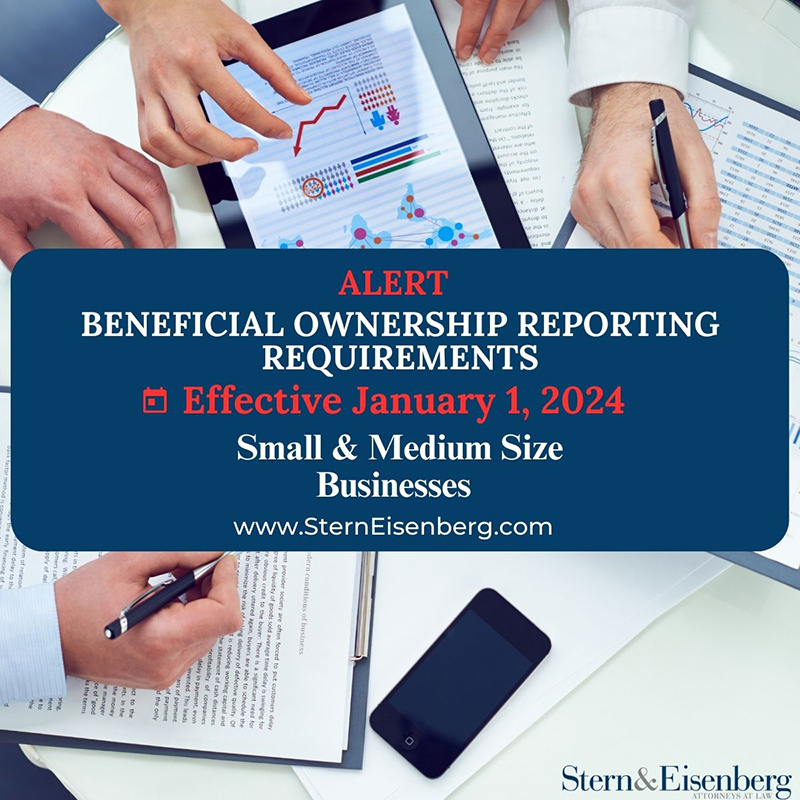Starting January 1, 2024, any existing US entity (and foreign legal entities that do business in the US) may need to comply with the new “beneficial ownership information” reporting requirement (the “BOI Rule”) from the US Financial Crimes Enforcement Network (“FinCen”), pursuant to the federal Corporate Transparency Act from 2021 and final rules recently approved by FinCen. FinCen estimates that upwards of almost 33 million entities in the US may be impacted by these new requirements.
Below is a summary of this new BOI Rule:
Any entity formed after 1/1/24, by the filing of organization paperwork with a state’s Dept of State or similar entity has 30 days from formation to file the FinCen paperwork.
- Any entity formed before 1/1/24 by the filing of any organization paperwork with a state’s Dept of State or similar entity will have until 12/31/24 to file the BOI report form.
- Under the new rules, such entities are referred to as “Reporting Companies.” Any Reporting Company must comply unless they are an “exempt entity.” Currently there are 23 exemptions, For example: large operating company exemptions apply, which is generally defined as an entity, that, (1) employs more than 20 full-time employees in the US; (2) filed a previous year tax return in the US demonstrating more than $5 million in gross receipts or sale in the aggregate; and (3) has an operating presence in the US. Subsidiaries of exempt companies are also generally exempt.
- If a reporting company filed a BOI report but then becomes exempt from filing the report, FinCen will apparently provide a reporting process for such a company to file an updated report indicating that it is no longer a reporting company.
- If an entity is a “reporting company” they need to submit to FinCen information relating to each of its “beneficial owner(s)” and “company applicant(s).”
- Generally, a beneficial owner is “an individual who, directly or indirectly, through any contract, arrangement, understanding, relationship, or otherwise: (i) exercises substantial control over the entity; or (ii) owns or controls not less than 25 percent of the ownership interests of the entity.”
- “Substantial control” over an entity for BOI reporting purposes is generally defined to mean, (1) service as a senior officer of a reporting company; (2) authority over the appointment or removal of any senior officer or dominant majority of the board of directors (or similar body) of a reporting company; and (3) direction, determination, or decision of, or substantial influence over, important matters of a reporting company.
- Note that under this definition, a beneficial owner for BOI reporting persons may be persons who have no ownership interest in the reporting company.
- For the ownership requirement, if applicable, “ownership interests” include generally anything that represents a capital interest in a reporting company, its profits, or any right or interest in the value of a reporting company (i.e., equity kickers, preferred shares, convertible instruments, warrants, certain debt instruments…).
- In addition to beneficial owners, a reporting company is required to submit information regarding the “company applicant,” which for US entities generally means the individual who files the document that forms the entity, and anyone who directs or controls the person who files the relevant document would also be a company applicant. However, this rule on company applicants applies only to new entities formed after 1/1/24 and does not require reporting companies to report company applicants if the entity is formed on or after 1/1/24.
- What information is required if an entity is a reporting company? The reporting company must provide its name, any alternative names through which it engages in business, its business street address, the jurisdiction of formation or registration and a unique identification number (such as an IRS TIN).
- For a beneficial owner and a company applicant, if applicable, the reporting company must provide an individual’s name, birthdate, residential or business address, and a unique identifying number from an “acceptable identification document” (such as passport or state driver’s license, or an apparent new option will be for such individuals to obtain a unique identifying number from FinCen upon request).
- Reporting companies have 30 days to report changes to the information in their previously filed reports, or correct inaccurate information in previously filed reports, within 30 days of when it becomes aware or has reason to know of the inaccuracy of information in earlier reports.
- There can be penalties for willfully failing to comply with this new FinCen rule, such as willfully failing to file a beneficial ownership information report, willfully filing false beneficial ownership information, or willfully failing to correct or update previously reported beneficial ownership information.
- Any person (which can include the reporting company itself, beneficial owner, company applicant, or anyone willfully providing the filer with false information to report) who willfully violates the BOI reporting requirements may be subject to civil penalties of up to $500 for each day that the violation continues. That person may also be subject to criminal penalties of up to two years imprisonment and a fine of up to $10,000.
QUESTIONS?
Please be on the lookout for additional updates from Stern & Eisenberg P.C. as they become available. Should you wish to discuss the Bill further, please do not hesitate to reach out to our Value Department or Thomas Shea, Esquire, Director of Business Planning.
For the BOI Small Business Compliance Guide, please click here. For a brochure about the Beneficial Ownership Information, please click here.
